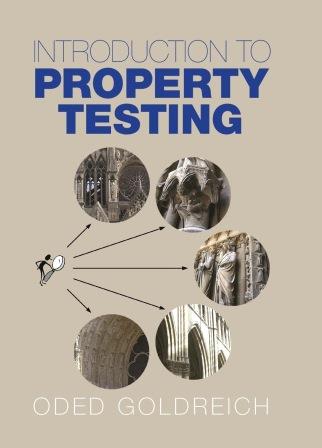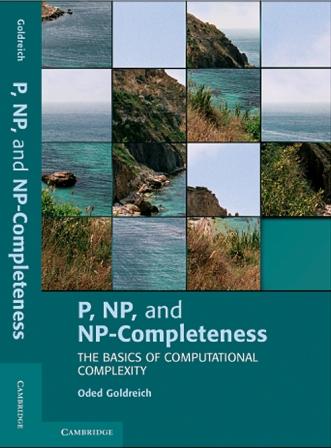
See also a collection of surveys and extended abstracts on property testing (edited in 2010).
In case you are using a slow connection, you may prefer fetching the text-only page.
Book listed in reverse chronological order and not including edited books.
 |
Property Testing is concerned with approximate decisions, where the
task is distinguishing between objects having a predetermined property
and objects that are ``far'' from having this property.
Typically, objects are modeled by functions,
and distance between functions is measured as the fraction
of the domain on which the functions differ.
We consider (randomized) algorithms that may query the function
at arguments of their choice,
and seek algorithms of very low complexity
(i.e., much lower than the size of the function's domain).
See also a collection of surveys and extended abstracts on property testing (edited in 2010). |
 |
The focus of this book is on the P-vs-NP Question,
which is the most fundamental question of computer science,
and on the theory of NP-completeness,
which is its most influential theoretical discovery.
The book also provides adequate preliminaries regarding
computational problems and computational models.
The P-vs-NP Question asks whether or not finding solutions
is harder than checking the correctness of solutions.
An alternative formulation asks whether or not discovering proofs
is harder than verifying their correctness.
Whilst the P-vs-NP Question remains unresolved,
the theory of NP-completeness offers evidence
to the intractability of specific problems in NP
by showing that they are universal for the entire class.
The current textbook is a significant revision of Chapter 2 and Section 1.2 of the author's book Computational Complexity: A Conceptual Perspective. |
 |
Complexity Theory is a central field of the theoretical foundations
of Computer Science, which is concerned with the general study of
the intrinsic complexity of computational tasks.
This book offers a conceptual perspective on complexity theory.
It is intended to serve as an introduction to the field,
and can be used either as a textbook or for self-study.
The book is also useful to experts, since it provides
expositions of various sub-areas of complexity theory.
The exposition starts from the intuitive questions,
as embodied in the concepts studies in each sub-area,
and discusses the importance of these questions,
definitional choices made in the actual formulation,
and the approaches and ideas hat underly the answers.
See also related texts on Computational Complexity (including surveys of the area). |
|
This two-volume work is aimed at presenting firm foundations for cryptography;
that is, presenting the paradigms, approaches and techniques
used to conceptualize, define and provide solutions
to natural ``security concerns''
as well as some of the fundamental results obtained using them.
The emphasis is on the clarification of fundamental concepts
and on demonstrating the feasibility of solving several central
cryptographic problems.
Volume 1 focuses on basic tools (One-Way Functions, Pseudorandomness and Zero-Knowledge), whereas Volume 2 focuses on basic applications (Encryption, Signatures and General Secure Protocols). See also related texts (including surveys of the area). |
 |
The interplay between randomness and computation is one
of the most fascinating scientific phenomena uncovered in
the last couple of decades.
This interplay is at the heart of modern cryptography
and plays a fundamental role in complexity theory at large.
Specifically, the interplay of randomness and computation
is pivotal to several intriguing notions of probabilistic proof systems
and is the focal of the computational approach to randomness.
This book provides an introduction to these three,
somewhat interwoven domains
(i.e., cryptography, proofs and randomness).
See related texts on Foundations of Cryptography, Probabilistic Proof Systems, Pseudorandomness, and Computational Complexity (at large). |
Back to Oded Goldreich's homepage